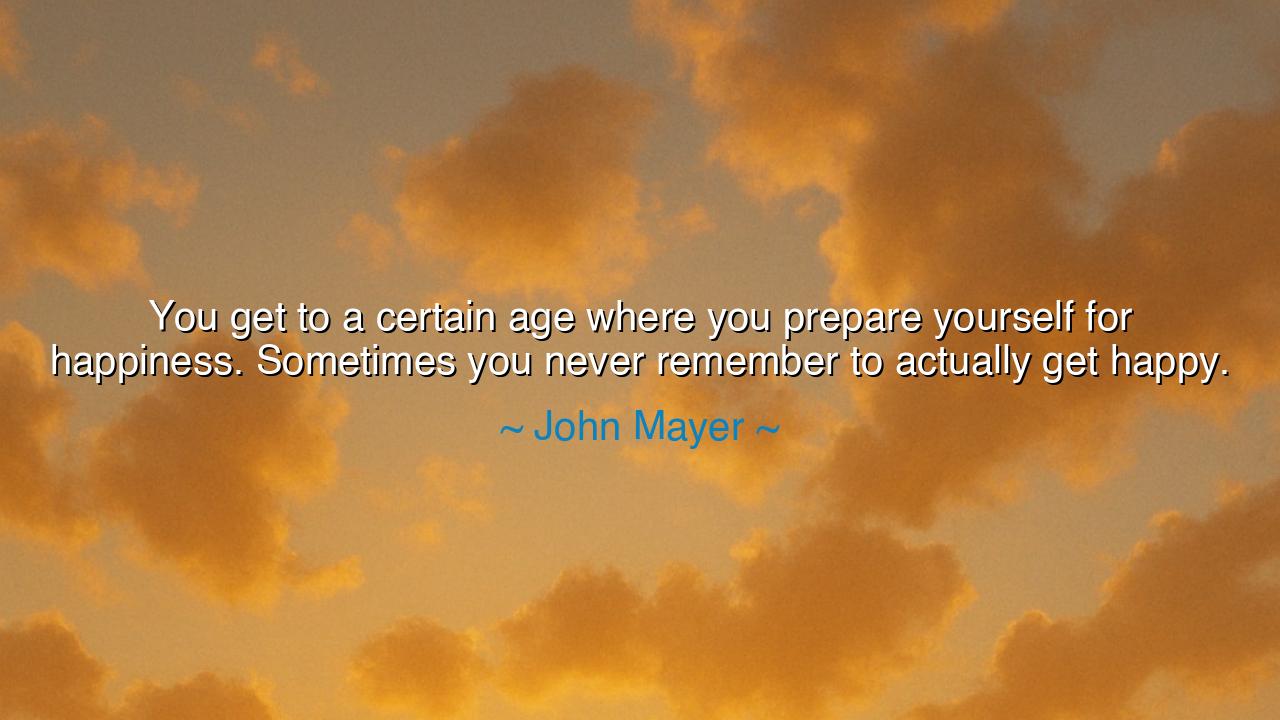
You get to a certain age where you prepare yourself for
You get to a certain age where you prepare yourself for happiness. Sometimes you never remember to actually get happy.






"You get to a certain age where you prepare yourself for happiness. Sometimes you never remember to actually get happy." These words, spoken by John Mayer, touch upon a profound truth about the human condition—the notion that we often become so consumed by preparation for happiness that we forget to fully experience it. Mayer captures the unspoken tension many feel as they move through life: the relentless pursuit of joy, success, or fulfillment, and the paradox that even after all the planning, striving, and waiting, happiness often remains elusive. This quote speaks to a deeper, universal human experience, one that acknowledges the weight of time and the challenge of seizing joy amidst life's endless demands and expectations.
In the ancient world, philosophers often explored the tension between the pursuit of happiness and the contentment that comes from being fully immersed in the present moment. The Greeks, for example, were deeply concerned with the question of eudaimonia, often translated as flourishing or the good life. Aristotle argued that happiness was not something to be attained through external means, but through virtue, self-reflection, and the development of character. However, Aristotle also warned against the pursuit of happiness for its own sake, suggesting that too much focus on happiness could actually distract from living a fulfilling life. In this way, Mayer’s quote resonates with Aristotle's warning: the more we chase happiness, the more we may find ourselves missing it when it arrives.
Similarly, the Stoics of ancient Rome, such as Seneca and Epictetus, believed that the key to true happiness lay not in external circumstances but in inner peace and self-control. The Stoic ideal of apatheia—freedom from unnecessary desires—is akin to Mayer’s insight. Seneca wrote that happiness is not the result of chasing pleasures or waiting for the right moment, but rather the cultivation of virtue and the discipline to enjoy life’s small joys without attachment to the outcome. Just as Seneca taught that peace comes from within, Mayer reminds us that despite our preparations for happiness, the simple act of embracing the present moment and finding contentment in it may be the key to truly experiencing happiness.
Consider the story of the Buddha, who, after a long period of intense meditation and ascetic practices, achieved enlightenment. What he realized was that happiness is not something to be pursued in an external sense, but rather a state of being that arises from understanding the impermanent nature of life. The Buddha's teachings emphasized the importance of letting go of attachment and simply being present in the moment, allowing happiness to emerge naturally. Much like Mayer’s reflection, the Buddha understood that preparing for happiness—whether through material gains or spiritual striving—was not the path to true joy. It was only through accepting the present moment, free of expectation, that one could find lasting peace.
The lesson in Mayer’s words is timeless: often, we are so caught up in the preparation for happiness—whether it be in our work, our relationships, or our goals—that we forget to actually experience it when it arrives. Like Seneca, who wrote about the dangers of being consumed by the future, Mayer’s quote reminds us that living for the future or constantly preparing for happiness can prevent us from experiencing the joy that is already present in the moment. Life is fleeting, and often the pursuit of an idealized future happiness blinds us to the simple, small moments that bring true joy.
In practical terms, this means that we must learn to slow down and be present in our lives. Rather than obsessing over the next goal, next achievement, or next step, we should focus on the present moment and the happiness that can be found in it. This is not to say we should abandon our dreams or aspirations, but we must approach them with balance, understanding that happiness does not only lie in the future. Just as the Buddha taught that peace arises in the present, we must embrace the present as a source of contentment and gratitude, rather than always looking ahead to the next thing.
Ultimately, Mayer’s reflection calls us to shift our perspective—to stop seeing happiness as something to be earned or achieved, and instead, to see it as a state of being that we can cultivate through mindfulness, gratitude, and presence. Let us, like Aristotle, focus on living virtuously and being true to ourselves in the here and now, rather than waiting for a perfect moment or perfect life. The key to happiness is not in the future, but in the way we engage with life each day. Embrace the present, find joy in the small moments, and in doing so, we may discover that happiness was always with us, quietly waiting for us to notice it.






AAdministratorAdministrator
Welcome, honored guests. Please leave a comment, we will respond soon